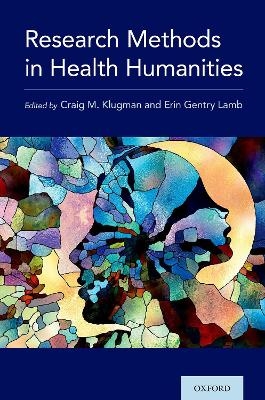
Research Methods in Health Humanities
Oxford University Press Inc (Verlag)
978-0-19-091851-4 (ISBN)
Research Methods in Health Humanities surveys the diverse and unique research methods used by scholars in the growing, transdisciplinary field of health humanities. Appropriate for advanced undergraduates, but rich enough to engage more seasoned students and scholars, this volume is an essential teaching and reference tool for health humanities teachers and scholars.
Health humanities is a field committed to social justice and to applying expertise to real world concerns, creating research that translates to participants and communities in meaningful and useful ways. The chapters in this field-defining volume reflect these values by examining the human aspects of health and health care that are critical, reflective, textual, contextual, qualitative, and quantitative. Divided into four sections, the volume demonstrates how to conduct research on texts, contexts, people, and programs. Readers will find research methods from traditional disciplines adapted to health humanities work, such as close reading of diverse texts, archival research, ethnography, interviews, and surveys. The book also features transdisciplinary methods unique to the health humanities, such as health and social justice studies, digital health humanities, and community dialogues. Each chapter provides learning objectives, step-by-step instructions, resources, and exercises, with illustrations of the method provided by the authors' own research.
An invaluable tool in learning, curricular development, and research design, this volume provides a grounding in the traditions of the humanities, fine arts, and social sciences for students considering health care careers, but also provides useful tools of inquiry for everyone, as we are all future patients and future caregivers of a loved one.
Craig Klugman, Ph.D., is Professor of Bioethics and Health Humanities at DePaul University. He serves on the ethics committee at Northwestern University Hospital. He is the author of over 450 articles, book chapters, op-eds, and blog posts on such topics as bioethics, digital medicine, professionalism, end-of-life issues, public health ethics, research ethics, education, health/medical humanities, ethics of execution, and health policy. He is the blog editor and frequent writer for bioethics.net as well as creator of the BioethicsTV column. Dr. Klugman is the editor of several books including Research Methods in the Health Humanities (Oxford University Press, 2019), Medical Ethics (Gale Cengage, 2016), and Ethical Issues in Rural Health (Johns Hopkins University Press, 2013; 2008). He has been interviewed for The New York Times, AARP News, Nightline, Vice, and national radio. Besides numerous academic journals, his writing has appeared in Pacific Standard Magazine, Huffington Post, LifeMattersMedia, Chicago Tribune, Medium, Cato Unbound, The Hill, San Francisco Chronicle, and the Houston Chronicle. Erin Gentry Lamb, Ph.D., is Herbert L. and Pauline Wentz Andrews Professor of Biomedical Humanities and Director of the Center for Literature and Medicine at Hiram College in Ohio. Her research interests focus on the social and ethical consequences of anti-aging consumer culture and medicine, ageism, the connections between age studies and disability studies, and the pedagogy of health humanities and age studies, including co-authoring a comprehensive report on Health Humanities Baccalaureate Programs in the United States and co-editing a special issue of The Journal of Medical Humanities focused on "Pre-Health Humanities" (2017). Her scholarly work has appeared in The Health and Humanities Reader, The Journal of Medical Humanities, The International Journal of Aging and Society, and Age, Culture, Humanities. A founding member of the North American Network in Aging Studies, she serves on the executive committee of the MLA's Forum on Medical Humanities and Health Studies.
Introduction: Raising the Health Humanities
Craig M. Klugman and Erin Gentry Lamb
Chapter 1. Denotation and Connotation
Sylvia A. Pamboukian
Chapter 2. Analyzing Metaphors
Anita Wohlmann
Chapter 3. Critical Approaches to Life-Writing
Allison Crawford
Chapter 4. Reading Film
Lorenzo Servitje
Chapter 5. Comics as a Research Method in Health Humanities
Muna Al-Jawad and MK Czerwiec
Chapter 6. Art History
Siobhan M. Conaty
Chapter 7. Archives
Claire D. Clark
Chapter 8. Health and Social Justice Studies
Sarah Berry
Chapter 9. Age Studies and Disability Studies
Erin Gentry Lamb and Rebecca Garden
Chapter 10. American Studies
Amy Rubens
Chapter 11. Digital Health Humanities
Kirsten Ostherr
Chapter 12. Ethnography
Eileen Anderson-Fye and Vanessa Hildebrand
Chapter 13. Autoethnography
Rose Richards
Chapter 14. Community Dialogues
Peggy L. Determeyer and Jerome W. Crowder
Chapter 15. Interviews
Craig M. Klugman
Chapter 16. Fiction Writing
Lise Saffran
Chapter 17. Surveys
Craig M. Klugman
Chapter 18. Mixed Methods Program Evaluation
Deepthiman Gowda, Tayla Curran, and Dorene F. Balmer
Chapter 19. Evidence Synthesis Methods
Stacey Springs and Jay Baruch
| Erscheinungsdatum | 02.10.2019 |
|---|---|
| Verlagsort | New York |
| Sprache | englisch |
| Maße | 155 x 231 mm |
| Gewicht | 522 g |
| Themenwelt | Medizin / Pharmazie ► Medizinische Fachgebiete ► Medizinethik |
| Studium ► Querschnittsbereiche ► Geschichte / Ethik der Medizin | |
| ISBN-10 | 0-19-091851-9 / 0190918519 |
| ISBN-13 | 978-0-19-091851-4 / 9780190918514 |
| Zustand | Neuware |
| Haben Sie eine Frage zum Produkt? |
aus dem Bereich


